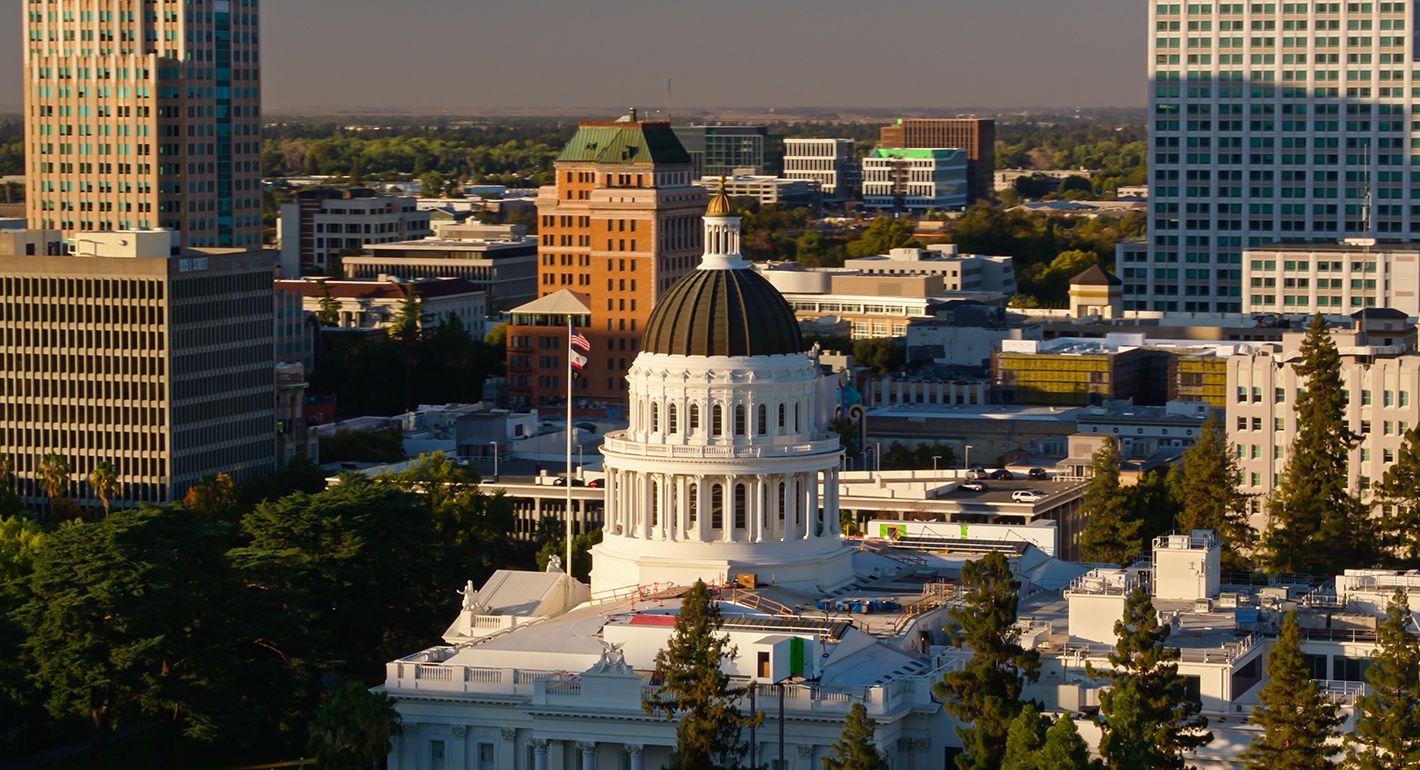Summary
The 2024 Carnegie California Global Affairs Survey reflects Californians’ heightened concerns about ongoing conflicts and critical elections, including in the United States. It arrives at a tense moment in American democracy and during a critical election year for many of the world’s leading democracies.
In fall 2023, the Carnegie Endowment for International Peace published the Carnegie California Global Affairs Survey, the first-ever public survey of Californians on global issues and their local impacts. The report offered a new, detailed, policy-relevant examination of how state residents think about the twenty-first century’s rapidly shifting global dynamics. Those findings showed that Californians understand the importance and value of global connections and the activities that inform them. They also highlighted the importance Californians put on Asia, both in terms of economic prosperity and security, as well as ongoing concerns around misinformation and disinformation, climate change, and the state of infrastructure in California and the United States.
The 2024 report builds upon the 2023 findings while evolving its focus in light of 2024’s notable elections, major geopolitical shifts, and diplomatic events and crises, including the unpredictability of U.S. support for Ukraine; diplomatic headway in the U.S.-China relationship; continuing tensions around Taiwan; Hamas’s attacks against Israel on October 7, 2023, and the subsequent war in Gaza, as well as elsewhere in the Middle East; and ongoing migration across the U.S.-Mexico border.
The survey questions went to the field in June 2024, as these conflicts and crises showed no sign of relenting. As democratic processes and institutions are put to the test, and diplomats struggle to find a path to peace, subtle but important shifts have occurred in how Californians think about diplomacy and global connections, regional priorities, and the threats to democracy.
- Californians continue to overwhelmingly believe that international affairs and domestic affairs are interconnected. In an increase from 2023, eight in ten respondents say they are interconnected “a great deal” or “a fair amount.” Consistent with that finding, a similar percentage of Californians believe diplomacy and international development are essential to U.S. security and prosperity and place a high value on diplomatic tone and style.
- When respondents are asked to rate six international issues as either major, minor, or no threat to California, misinformation tops the list of major threats, followed by cyberattacks, climate change, supply chain disruptions, infectious disease, and artificial intelligence. Californians also express notable attention to, and interest in, the numerous elections held in 2024, but also to the health of democracy in the United States. Californians widely believe that the 2024 U.S. elections are more important than the 2020 elections for the future of democracy and that U.S. democracy has gotten worse in the past years. Additionally, more respondents say that the discourse and tone of Washington, DC, has had negative impacts than say it has had positive impacts on democracy in California.
- Californians have a broad sense of the direction and health of the United States’ bilateral and multilateral relationships in the Pacific. Californians’ understanding of the status and importance of relationships with key actors in the region tracks well with this year’s notable diplomatic events in Asia and Latin America. For instance, Californians do not view the U.S.-China relationship as especially strong, but they also do not consider it to be in crisis.
- Migration at the U.S.-Mexico border has been a visible topic of policy discussion. Californians are fairly in line with the broader U.S. consensus that the state of migration at U.S.-Mexico border is a cause for concern and that policymakers need to do more to address the issue.
- Californians support the state having a role in the complex web of relations—including formal diplomacy, trade, and cultural and educational exchanges—that make up global affairs.
Reflecting both the evolving perspectives of Californians on global affairs, the 2024 report is structured around four sections: 1) Diplomacy, Development, and Trade: The Value of Global Engagement; 2) Democracy: Values and Vulnerabilities; 3) California and Transpacific Affairs; and 4) California and Subnational Affairs.
Survey
This is the second year of the Carnegie California Global Affairs Survey. Findings in this paper are based on a survey of 1,500 adult California residents. The survey was conducted via YouGov between May 25 and June 18, 2024, in English and Spanish according to respondents’ preferences. The questions in four topic areas were designed by the Carnegie California survey team. The Carnegie California survey team invited input, comments, and suggestions from policy experts and its own advisory group—including advisers from state and local government, California universities and think tanks, and civil society—during a workshop in March 2024, but survey methods, questions, and content were solely determined by the Carnegie California survey team.
YouGov interviewed 1,554 adult California residents (aged eighteen and above), who were then matched down to a sample of 1,500 to produce the final dataset. The respondents were matched to a sampling frame on gender, age, race, and education. The sampling frame is a politically representative modeled frame of U.S. adults based on the American Community Survey public use microdata file, public voter file records, the 2020 Current Population Survey Voting and Registration supplements, the 2020 National Election Pool exit poll, and the 2020 Current Employment Statistics surveys, including demographics and 2020 presidential vote. The matched cases were weighted by YouGov to the sampling frame using propensity scores. The matched cases and the frame were combined, and a logistic regression was estimated for inclusion in the frame. The propensity score function included age, gender, race and ethnicity, years of education, region, home ownership, and presidential vote choice. The propensity scores were grouped into deciles of the estimated propensity score in the frame and post-stratified according to these deciles. The weights were then post-stratified on presidential vote and four ways on gender, age (four categories), race (four categories), and education (four categories) to produce the final weight.
The YouGov panel includes information about each respondent’s demographic and political profile used in this paper. We present results for four racial/ethnic groups: Asian Americans, Black Americans, Latinos, and White Americans. Residents of other racial and ethnic groups are included in the results reported for all adults, but sample sizes for these less populous groups are not large enough to report separately. We present results for five geographic regions, accounting for approximately 90 percent of the state population. “Central Valley” includes the counties Butte, Colusa, El Dorado, Fresno, Glenn, Kern, Kings, Madera, Merced, Placer, Sacramento, San Joaquin, Shasta, Stanislaus, Sutter, Tehama, Tulare, Yolo, and Yuba. “San Francisco Bay Area” includes Alameda, Contra Costa, Marin, Napa, San Francisco, San Mateo, Santa Clara, Solano, and Sonoma counties. “Los Angeles” refers to Los Angeles county; “Inland Empire” refers to Riverside and San Bernardino counties; and “Orange/San Diego” refers to Orange and San Diego counties. Residents of other geographic areas are included in the results reported for all adults, but sample sizes for these less populous areas are not large enough to report separately. We also report the results for those who identify as Democratic, Republican, independent, and other voters, but sample sizes for other voters are not large enough to report separately.
The overall margin of error is +/- 3.5 percent. The margin of error is calculated at the 95 percent confidence interval. We compare current Carnegie California Global Affairs Survey results to the 2023 Carnegie California Global Affairs Survey which was conducted with the same methodology and a number of national and regional surveys.1 The latter include surveys from the Chicago Council on Global Affairs (2023),2 Pew Research Center (2022),3 the Public Policy Institute of California (2001),4 the Carnegie Endowment for International Peace (2022 and 2023),5 and Gallup (2024).6
The full survey questions and responses can be found here.
Section 1. Diplomacy and Trade: The Value of Global Engagement
In November 2023, U.S. President Joe Biden and Chinese President Xi Jinping met in Woodside, California, on the sidelines of the Asia-Pacific Economic Cooperation Leaders’ Meeting in San Francisco. The meeting between the two leaders was just one highlight of a dizzying diplomatic year to follow for the United States. To the usual cadence of North Atlantic Treaty Organization (NATO), Group of (G7), and Group of Twenty (G20) summits were added state dinners with Japan and Kenya and initiatives to strengthen ties with India and allies in Asia. The diplomatic efforts were coupled with the continuing implementation and bolstering of legislation and trade restrictions meant to strengthen U.S. infrastructure and competitiveness, particularly around artificial intelligence (AI) and emerging technologies. This diplomatic business of tending the garden of relationships, as George Kennan put it, was matched by the historic nature of, as Harold Wilson quipped, “events, dear boy, events.”7
On Global Engagement and Diplomacy
Amid geopolitical unrest, great power competition, and acute regional crises, Californians overwhelmingly and increasingly believe that international affairs and domestic affairs are interconnected. Eight in ten say they are interconnected “a great deal” or “a fair amount.” Compared to a year ago, more now hold the view that international and domestic affairs are interconnected a great deal (25 percent in 2023 versus 36 percent in 2024). Today, the view that international affairs and domestic affairs are interconnected a great deal is held more often by college graduates (45 percent), Asian Americans (44 percent), and those with incomes of $100,000 or more (43 percent) and varies among partisans.
Consistent with their perspectives on global connectivity, Californians continue to value diplomacy and international development. As seen in figure 1, when asked to what degree do they consider diplomacy and international development essential to U.S. security and prosperity, more than 80 percent of Californians respond a “great deal” or a “fair amount.” For those who answer “a great deal,” there is strong continuity across regions, the San Francisco Bay Area (51 percent), including Los Angeles (48 percent), San Diego (48 percent), the Central Valley (45 percent), and the Inland Empire (45 percent).
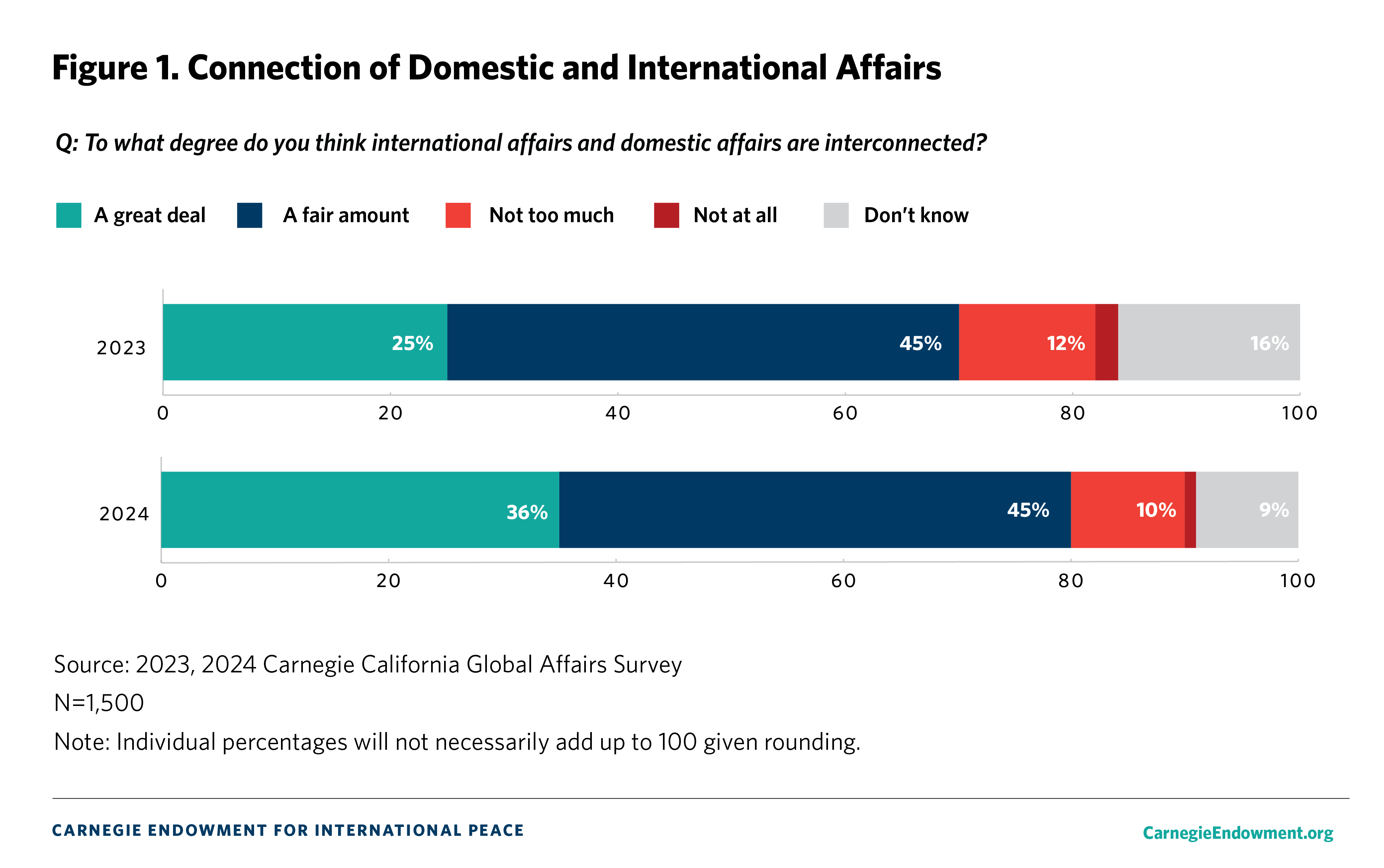
The importance Californians place on global affairs and relationships continues into their voting preferences. While foreign policy is often considered secondary to domestic issues in voting preferences, global challenges that cross borders may dissolve that divide. When asked, in thinking about the presidential election in November, how important are the candidates' positions on global challenges—such as climate change, democracy, housing, migration, and trade—in determining your vote, 59 percent of Californians respond “very important” and another 26 percent “somewhat important.” While responses are similar across regions, there is a notable partisan divide, with 71 percent of registered Democrats responding “very important” and 52 percent of registered Republicans saying the same.
Consistent with their support for diplomacy and development, Californians place a high value on diplomatic style. When asked how important are the candidates’ diplomatic skills—and their relationships and global standing with other leaders—in determining your vote, 57 percent and 29 percent of Californians answer “very important” and “somewhat important,” respectively. When it comes to diplomatic style and relationships, the notable divide within California is driven less by partisan affiliation and more by age. Whereas 72 percent of people aged sixty-five and older identify diplomatic skills as “very important” to their vote, that number falls for younger generations and drops to 41 percent for people aged eighteen to twenty-nine.
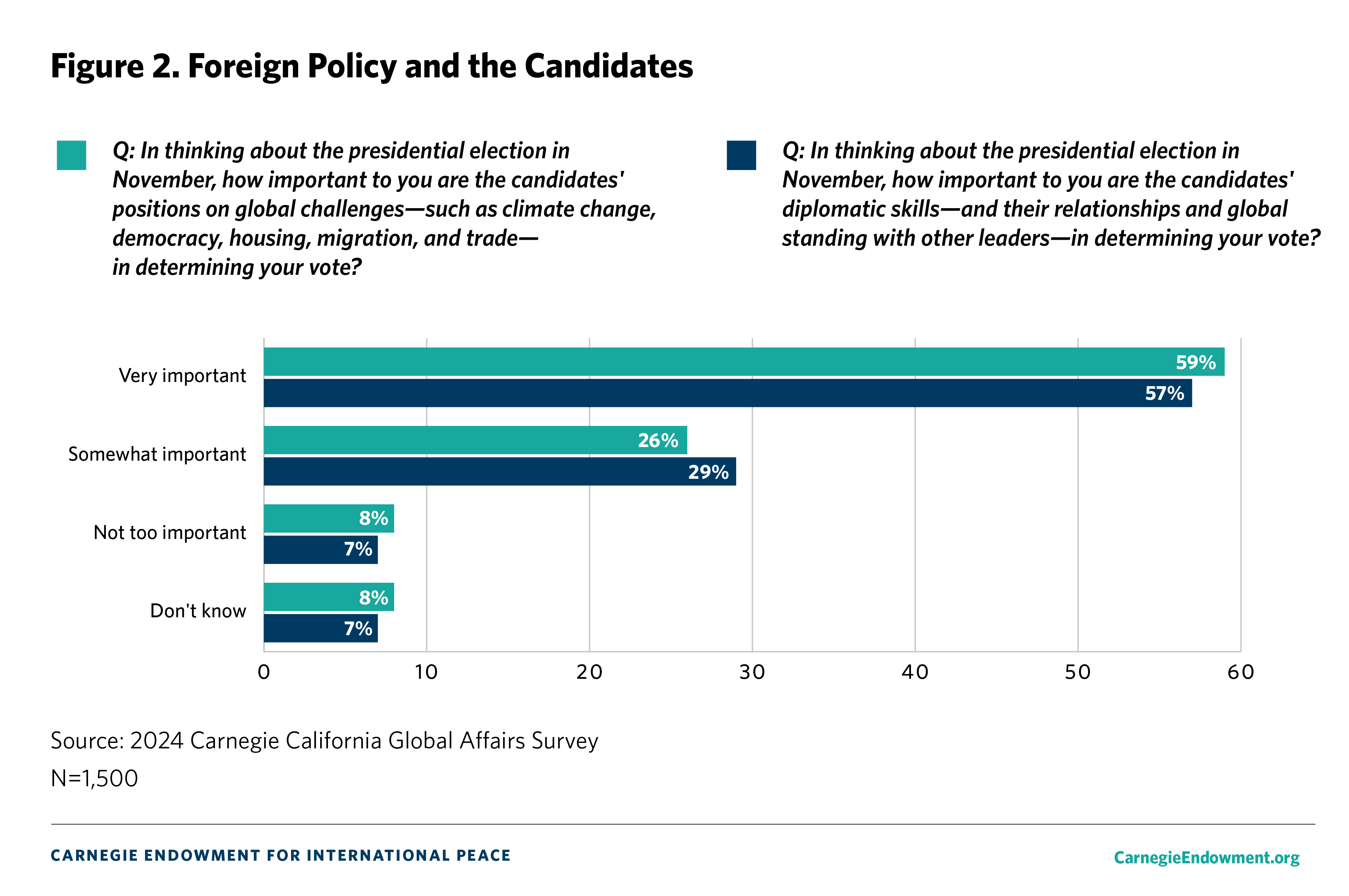
On Geopolitics and Crises
Californians continue to believe in the importance of U.S. global leadership. A majority (64 percent) of Californians believe the United States should play a leading role in preventing the spread of nuclear weapons, a number that increased from 58 percent in 2023. A majority (57 percent) of Californians believe the United States should play a leading role in addressing global climate change. And, in another uptick from 2023, a majority (53 percent) believe the United States should play a leading role promoting human rights and democracy around the world. While both Republicans and Democrats are likely to support U.S. leadership on global nonproliferation, there is strong partisan divide about whether the United States should play a leading role on climate change (78 percent of Democrats and 21 percent of Republicans) and human rights and democracy (70 percent of Democrats and 38 percent of Republicans).
Support for U.S. global leadership occurs in the context of ongoing tectonic shifts in geopolitics and great power relations as well as in continuing and new conflicts. Californians continue to look westward toward Asia when it comes to U.S. economic prosperity: 43 percent identify Asia as the most important region to the nation’s prosperity, an increase from 35 percent in 2023. Asia is followed by Europe (28 percent), Latin America (13 percent), the Middle East (9 percent), and Africa (6 percent).
Amid the ongoing war in Ukraine and Hamas’s attacks against Israel on October 7, 2023, and the subsequent war in Gaza, the regional priorities related to U.S. security have shifted notably. When asked which region is most important to U.S. security, the highest proportion of Californians identify Europe (34 percent in 2024, compared to 28 percent in 2023), followed by Asia (26 percent in 2024 and 31 percent in 2023). In 2024, 25 percent of Californians identify the Middle East compared to 19 percent in 2023.
Looking at the war in Gaza, in particular, there are notable divides in the opinion of Californians, especially by political party and age. As seen in figure 3, Californians are split when asked which form of U.S. engagement they support in the Israel-Hamas war, with 35 percent selecting humanitarian aid to Gaza and 22 percent selecting military aid to Israel. 23 percent support both approaches equally, and 20 percent say neither. Democrats and Republicans differ dramatically in their responses, with 48 percent of Democrats exclusively more aid for Gaza and only 10 percent of Republicans saying the same. Meanwhile, only 12 percent of Democrats exclusively support more military aid to Israel, compared to 51 percent of Republicans. There are similarities in support of both approaches (27 percent of Democrats and 21 percent of Republicans).
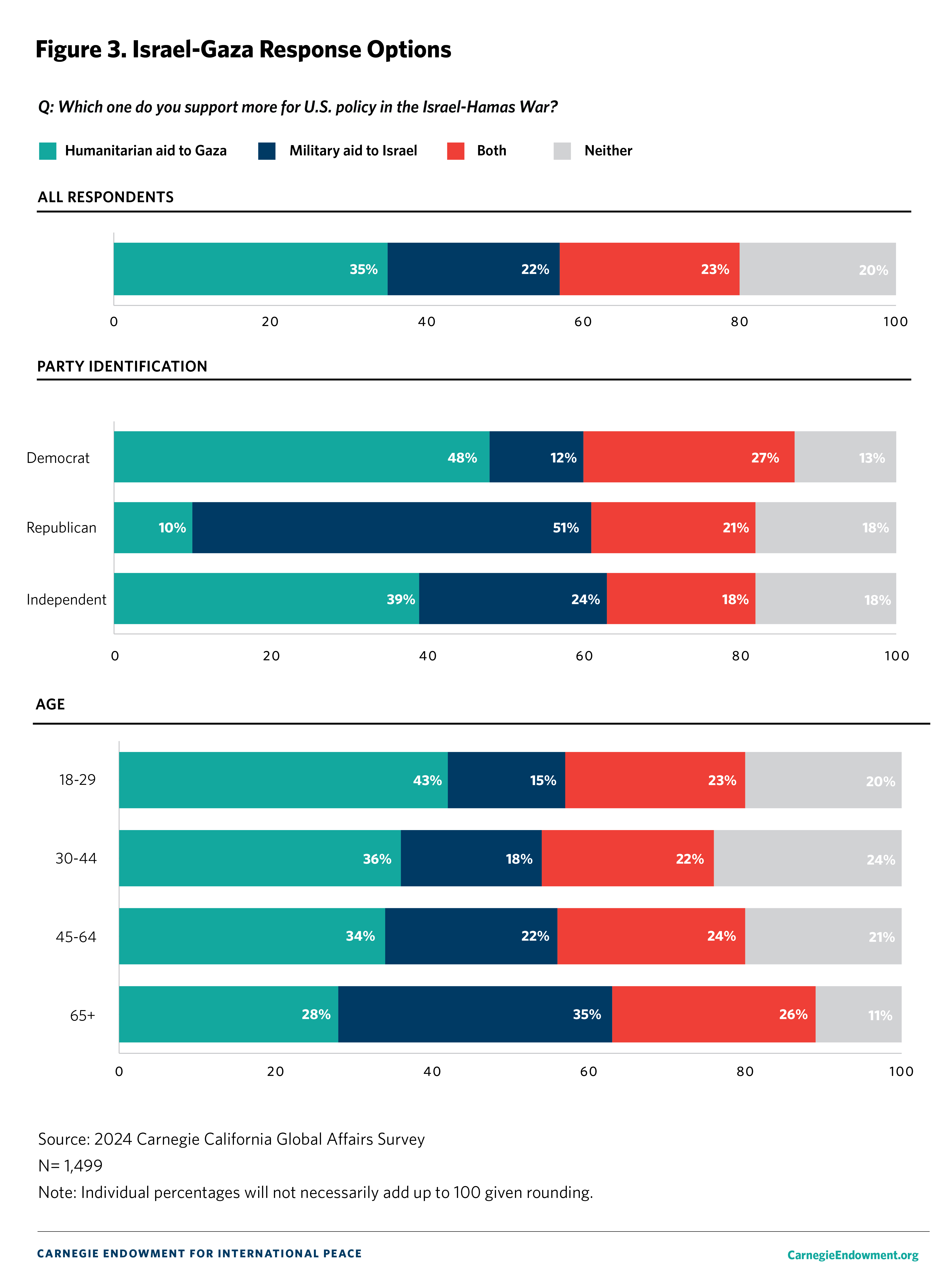
Protests and counter-protests about the war in Gaza roiled U.S. college campuses in the spring and summer of 2024, and significant generational divides can be found in potential policy responses to the conflict and humanitarian crisis.8 Among people under thirty years old, support for more aid to Gaza (42 percent) far outweighs more military support to Israel (15 percent) or both (23 percent). Meanwhile, Californians over sixty-five take a decidedly different set of views, with support for more military support to Israel (35 percent) outweighing more aid to Gaza (28 percent) or both (26 percent).
Section 2. Democracy: Values and Vulnerabilities
California is impacted by a myriad of economic, environmental, social, and political trends outside of the state’s borders. Californians are regularly reminded of the state’s connections to global and national affairs as they confront climate change, transnational migration, shipping and international trade, emerging technologies and social media, and the potential consequences of the U.S. elections on California. How do Californians view these challenges and their impacts on California today and in the future?
Connection of Global/Local
We asked respondents to rate six international issues as either major, minor, or no threat to California. The spread of misinformation tops this list, with 61 percent identifying it as a major threat. Majorities also think that cyberattacks (59 percent), climate change (57 percent), and supply chain disruptions (52 percent) are major threats. Fewer than half say that infectious diseases (49 percent) and the development of AI (38 percent) are major threats. Several issues are now more likely to be seen as major threats compared to a year ago: misinformation (54 percent in 2023 versus 61 percent in 2024), cyberattacks (49 percent in 2023 versus 59 percent in 2024), and supply chain disruptions (47 percent in 2023 versus 52 percent in 2024).
Today, majorities across demographics, partisan groups, and regions think that misinformation is a major threat. Majorities across demographic groups say that climate change is a major threat. Democrats (76 percent) are much more likely than Republicans (25 percent) and somewhat more likely than independents (52 percent) to hold the view that climate change is a major threat to California.
Climate Change
Three in four Californians view climate change as a major or minor threat to California. In this context, 45 percent say that the United States’ position as a global leader on climate change is economically beneficial to California (25 percent say no, and 30 percent say do not know). This view was similar in 2023. Today, majorities of Democrats (67 percent), Black Californians (54 percent), and college graduates (53 percent) and those with incomes of $100,000 or more (53 percent) have positive views of U.S. leadership on climate change. Opinions about the economic benefits to California differ across the state’s regions (see figure 4).
More Californians name the state government (31 percent) than name the federal government (25 percent) or local governments (8 percent) as doing the most to respond to climate change. (In addition, 35 percent say do not know.) These results were similar a year ago. Today, the belief that the state government is doing the most on climate change is higher among Democrats (43 percent) than Republicans (23 percent) and independents (36 percent) and increases generally with higher income and college education.
Most Californians (67 percent) say they believe that the needs and interests of different generations, including young people and the elderly, should be considered in decisions about emissions reductions and adaptation. Moreover, 67 percent of Californians say the needs and interests of future generations should be considered. These two perspectives are largely unchanged from a year ago. Today, majorities across demographic and partisan groups and regions say that the needs and interests of different generations and future generations should be taken into account today in planning for climate change.
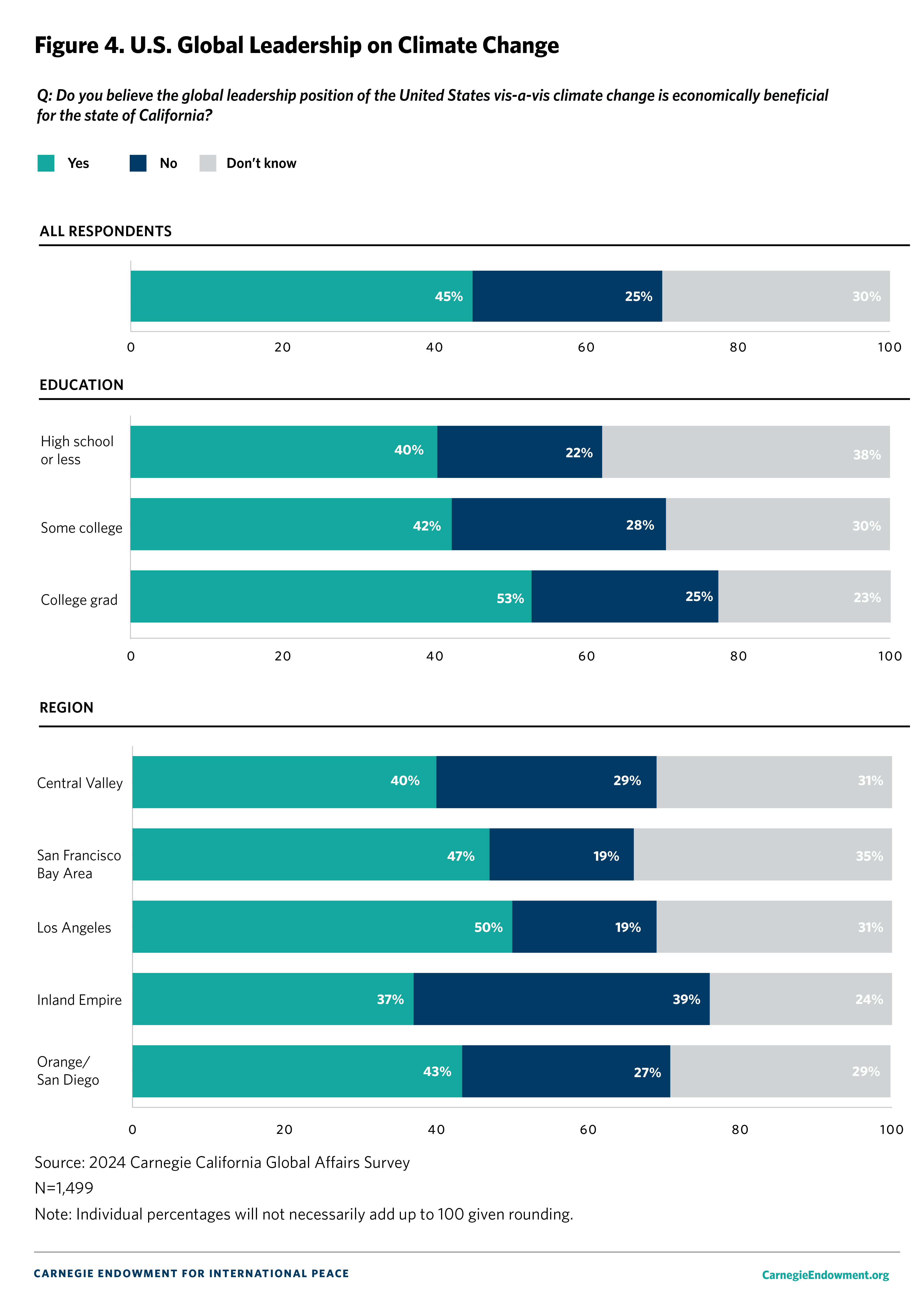
Democracy
The 2024 U.S. elections will occur in the context of polarization, and the outcome is considered to be highly consequential across the fifty states and around the world. Californians agree that the stakes are high, and the setting is challenging for this year’s elections.
Most Californians (68 percent) believe that the 2024 elections are “more important” for democracy in the United States than the 2020 elections. Few see this year’s elections as less important (4 percent) or the same (20 percent). This perception is strongly held across all demographic groups and state regions. Majorities across political parties, including 76 percent of Democrats, 80 percent of Republicans, and 67 percent of independents say the 2024 elections are more important for U.S. democracy than the 2020 elections.
Recognizing the negative impacts of polarization, a majority of Californians (60 percent) believe that the U.S. democracy “has gotten worse” compared to five years ago. Only 14 percent say it is working better, while 17 percent say it is working the same as it was five years ago. Majorities across all regions believe that the U.S. democracy has gotten worse. Adults under thirty years old (49 percent) are less likely than those sixty-five and older (70 percent) to hold this negative view. Republicans (77 percent) and independents (72 percent) are more likely than Democrats (46 percent) to say that the U.S. democracy has gotten worse.
For the 2024 elections specifically, 64 percent are very or somewhat confident that ballots in California will be cast and counted accurately. Majorities express confidence in the state’s election system across demographic groups. However, 39 percent of Republicans compared to 89 percent of Democrats and 62 percent of independents have confidence in the ballots cast and counted in California in 2024.
Infrastructure
Most Californians believe that supply chain disruptions are a threat to California, and more view this as a major threat compared to a year ago. In this context, how do Californians view the state’s infrastructure?
Sixty-two percent say they are concerned about operations and capacity at California’s ports, with 19 percent saying they are very concerned. Similarly, 62 percent say they are concerned about shipping and trade relationships between Asia and California. Eighteen percent say they are very concerned about this issue. Majorities across partisan groups, demographic groups, and state regions express concerns about California ports and shipping and trade relationships between Asia and California.
Most Californians (79 percent) believe that the needs and interests of different generations, including young people and the elderly, should be considered in infrastructure and housing plans. Californians are also largely in agreement when asked if the needs and interests of future generations should be considered in infrastructure and housing plans, with 70 percent saying yes. These two perspectives are largely unchanged from a year ago. Today, majorities across demographic groups, partisan groups, and regions say that the needs and interests of different generations and future generations should be taken into account today around infrastructure and housing plans.
Misinformation and Disinformation
Californians overwhelmingly believe that the spread of misinformation is a threat to their state. How are these attitudes impacting concerns about misinformation and disinformation in the 2024 elections?
Seven in ten Californians are concerned about the possibility of misinformation from foreign governments in the 2024 elections; 33 percent are very concerned and 37 percent are somewhat concerned about this possibility. Solid majorities across demographic groups, partisan groups, and state regions are at least somewhat concerned about misinformation from foreign governments. Democrats (45 percent) are much more likely than Republicans (25 percent) and independents (27 percent) to say they are very concerned about the possibility of misinformation from foreign governments in the 2024 elections.
A similar 75 percent say they are concerned about the possibility of AI enabling interference in the 2024 elections, with 37 percent saying they are very concerned and 38 percent being somewhat concerned. Solid majorities across state regions and demographic and partisan groups are at least somewhat concerned about AI enabling interference. Those most likely to say they are very concerned about AI enabling interference in the 2024 elections are residents of the Inland Empire (48 percent) and Central Valley (43 percent), those sixty-five and older (45 percent), renters (43 percent), and Republicans (43 percent).
Social media platforms play an important role as information sources in democracies and elections around the world. However, relatively few Californians say that social media has a positive impact on democracy. When it comes to social media’s impact on democracy globally, 21 percent say that social media is a “good thing” and 28 percent say it is a “bad thing.” (Forty-one percent are neutral, and 10 percent say do not know).
When asked about the impacts of social media on U.S. democracy, 23 percent say it is a good thing and 32 percent say it is a bad thing. (Thirty-five percent are neutral, and 10 percent say do not know). Fewer than three in ten people across partisan groups say that social media is a “good thing” for U.S. democracy.
Similarly, 25 percent think that social media’s impact on democracy in California is positive and 30 percent say it is negative. (Thirty-five percent are neutral, and 10 percent say do not know). Younger adults are more likely than older adults to say that social media is a good thing for democracy in California (see figure 5).
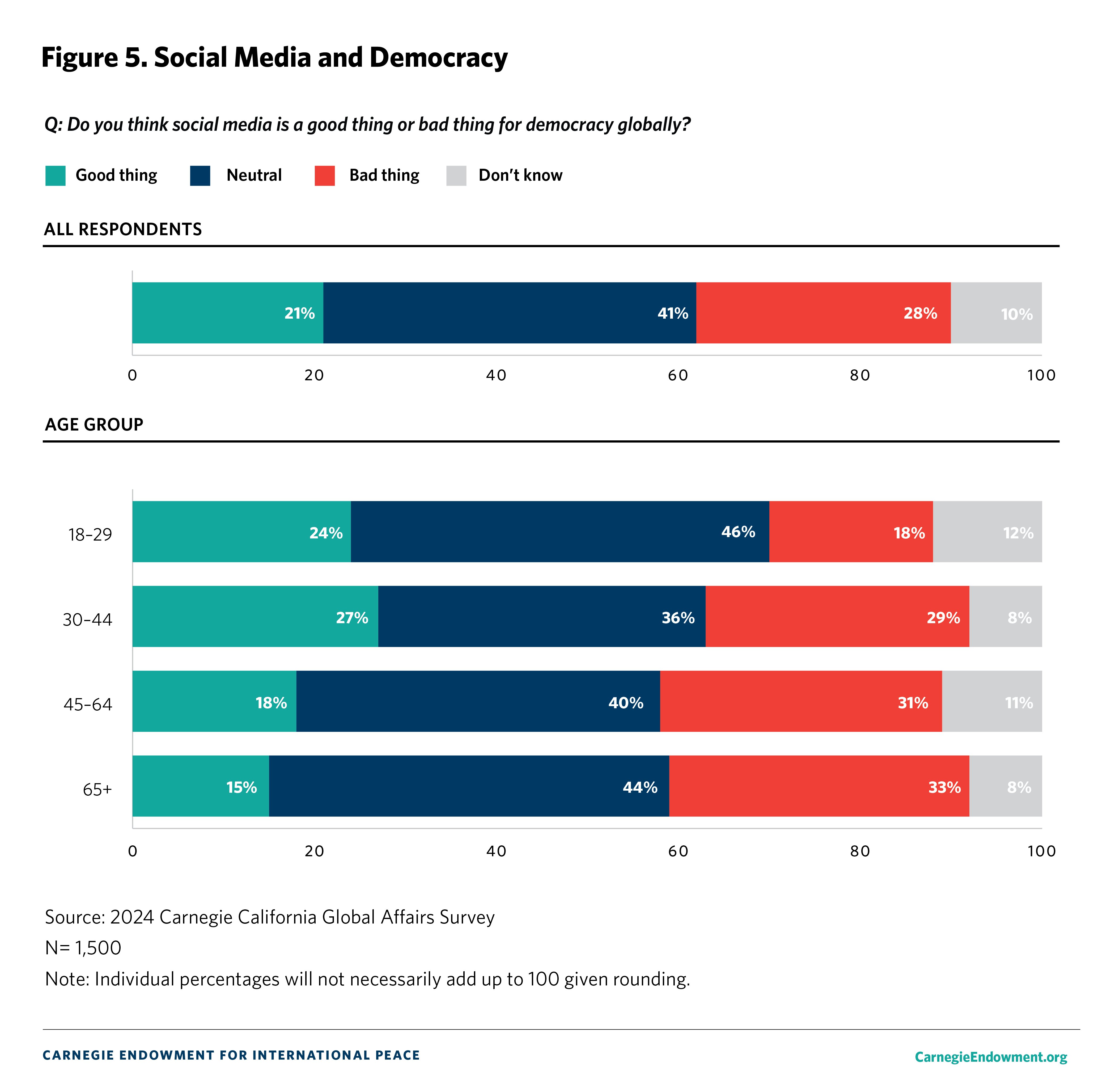
Artificial Intelligence
AI is one of the most important policy issues facing California, the United States, and the world. In September 2023, California emerged as a vanguard of AI policy with the AI Executive Order (N-12-23), and 2024 saw intense policy debate around the Safe and Secure Innovation for Frontier Artificial Intelligence Models Act (SB 1047), which was ultimately vetoed in September 2024. Given the state’s leadership, the Carnegie California survey seeks to understand how much Californians know about AI, their hopes and fears for AI, and what role they want for government in making AI policy.
Sixty-eight percent of Californians say they are familiar with the concept of generative AI, with 20 percent saying they are “very familiar” and 48 percent saying they are somewhat familiar. The share who says that they are very familiar with AI increases with college education and higher income. The share is also larger among men (28 percent) than women (13 percent) and larger among the eighteen to twenty-nine demographic (38 percent) than the sixty-five and older demographic (7 percent).
Californians are more likely to say they are “worried” (30 percent) or “pessimistic” (20 percent) than to say they are “optimistic” (26 percent) or “excited” (9 percent) about AI. (Fourteen percent say they don’t know.) More Black Americans (56 percent) and Asian Americans (53 percent) than White Americans (35 percent) and Hispanics (26 percent) say they are either optimistic or excited about AI. Those who say they are worried or pessimistic about AI most often cite its negative impacts on national security (31 percent), jobs and the economy (26 percent), and social stability and community (23 percent). Those who say they are excited or optimistic about AI most often cite its positive impacts on science (26 percent), healthcare (23 percent), and jobs and the economy (21 percent). These general feelings about AI and its impacts were similar a year ago.
Despite the state’s significant policy developments, Californians believe that the federal government (60 percent) rather than the state government (26 percent) or local governments (13 percent) is doing the most to respond to the challenges associated with AI. Majorities across all demographic groups, partisan groups, and state regions express this perception.
Moreover, 45 percent of Californians think that the federal government is “not doing enough,” 6 percent say it is doing “too much,” and 21 percent say it is doing “the right amount” to respond to the potential benefits and risks of AI. (Twenty-eight percent say they do not know.) Many Californians across partisan groups, demographic groups, and state regions say the federal government is not doing enough (see figure 6).
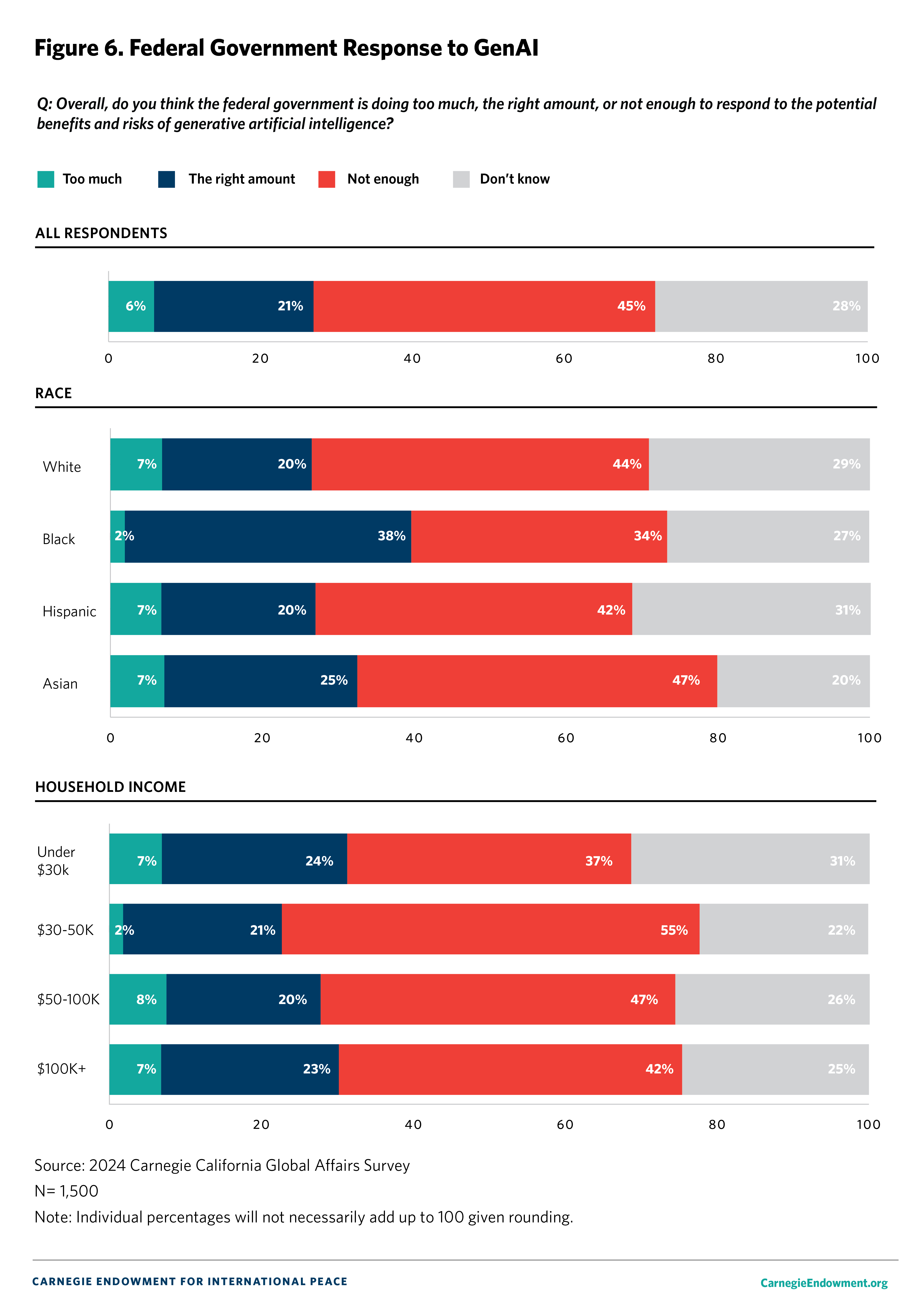
Fifty-one percent of Californians support an international agreement on AI standards and 17 percent oppose it. (Thirty-two percent say they do not know.) The supporters of an international AI agreement outnumber the opponents in all demographic groups and state regions. Across partisan groups, 69 percent of Democrats say they support an international AI agreement compared to 39 percent of Republicans and 55 percent of independents. The perceptions of government’s role in AI are largely unchanged from a year ago.
Section 3. California and Transpacific Affairs
Over the past twelve months, the Biden administration has continued to strengthen its relationships with allies and partners in the Indo-Pacific. These diplomatic efforts have included a number of high-level meetings in Washington, DC, including the first ever trilateral leaders summit between Japan, the Philippines, and the United States.9 The administration has also advanced its bilateral and multilateral partnerships with Latin American countries, including through the Americas Partnership for Economic Prosperity Leaders’ Summit on November 3, 2023, in Washington, DC.10 However, such efforts in Latin America have often been overshadowed by mounting domestic political pressure to address the influx of migrants at the U.S.-Mexico border.11
California remains an essential subnational actor in the diverse diplomatic arrangements linking the United States and transpacific partners. Cities across California nurture their diplomatic and economic ties with Latin America and Asia through trade missions and hosting foreign dignitaries from partnering nations and cities.12 Ties with these regions remain vital also for diasporic connections because nearly half of Californians have at least one immigrant parent and most California immigrants hail from Asia or Latin America.13 Being a border state, California’s governor and its cities’ leaders have signaled support for Biden’s June 2024 executive action, which aims to secure the border, and have called for bipartisan immigration reform.14
Asia
Californians widely recognize relations with China as important to the United States, with 44 percent saying relations with China are “very important” and 40 percent saying they are “somewhat important.” This is consistent with how Californians responded in 2023 (43 percent very important and 38 percent somewhat important). However, as seen in figure 7, while Californians believe the U.S. relationship with China is important, most view the current state of the bilateral relationship to be either “fair” (39 percent) or “poor” (37 percent). Only 2 percent of respondents believe the relationship to be “excellent” and 9 percent “good.” Broadly speaking, Californians do not view the U.S.-China relationship as especially strong, but they also do not overwhelmingly believe the relationship is in a dire state. The margin between “fair” and “poor” has thinned compared to 2023, when more respondents said the relationship was “poor” (45 percent) than those who said it was “fair” (31 percent). Across demographic groups, adults aged sixty-five and up (51 percent), Republicans (55 percent), independents (49 percent), or suburban-located respondents (44 percent) most strongly hold the view that the relationship is “poor.” Some demographic groups switched their 2023 response from “poor” to “fair” in the 2024 survey. Respondents who changed their responses to “fair” in 2024 were those with incomes between $30,000 and $50,000 (47 percent), with incomes over $100,000 (46 percent), or who live in a small city (50 percent).
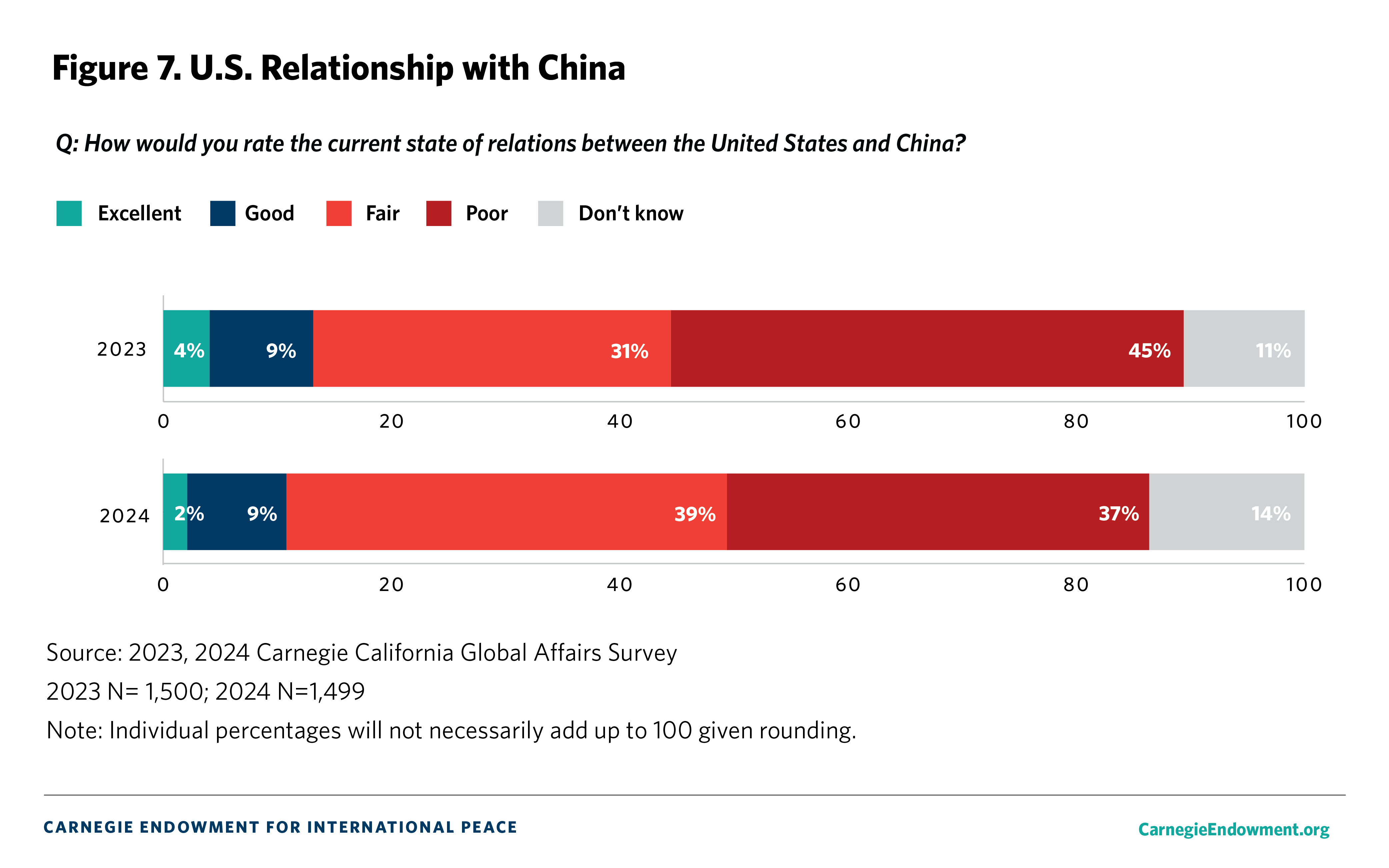
Meanwhile, for Californians “cooperation on regional and global issues” remains the most important issue in the U.S.-India relationship (31 percent), the U.S.-Japan relationship (35 percent), and the U.S.-South Korea relationship (28 percent). Similar to the 2023 survey, Californians find “economic issues” in the U.S.-India relationship (25 percent) and the U.S.-Japan relationship (27 percent) to closely follow cooperation as the most important area. This year’s survey includes “security issues” as an additional issue area, and it is respondents’ second selection (22 percent) when it comes to relations between the United States and South Korea.
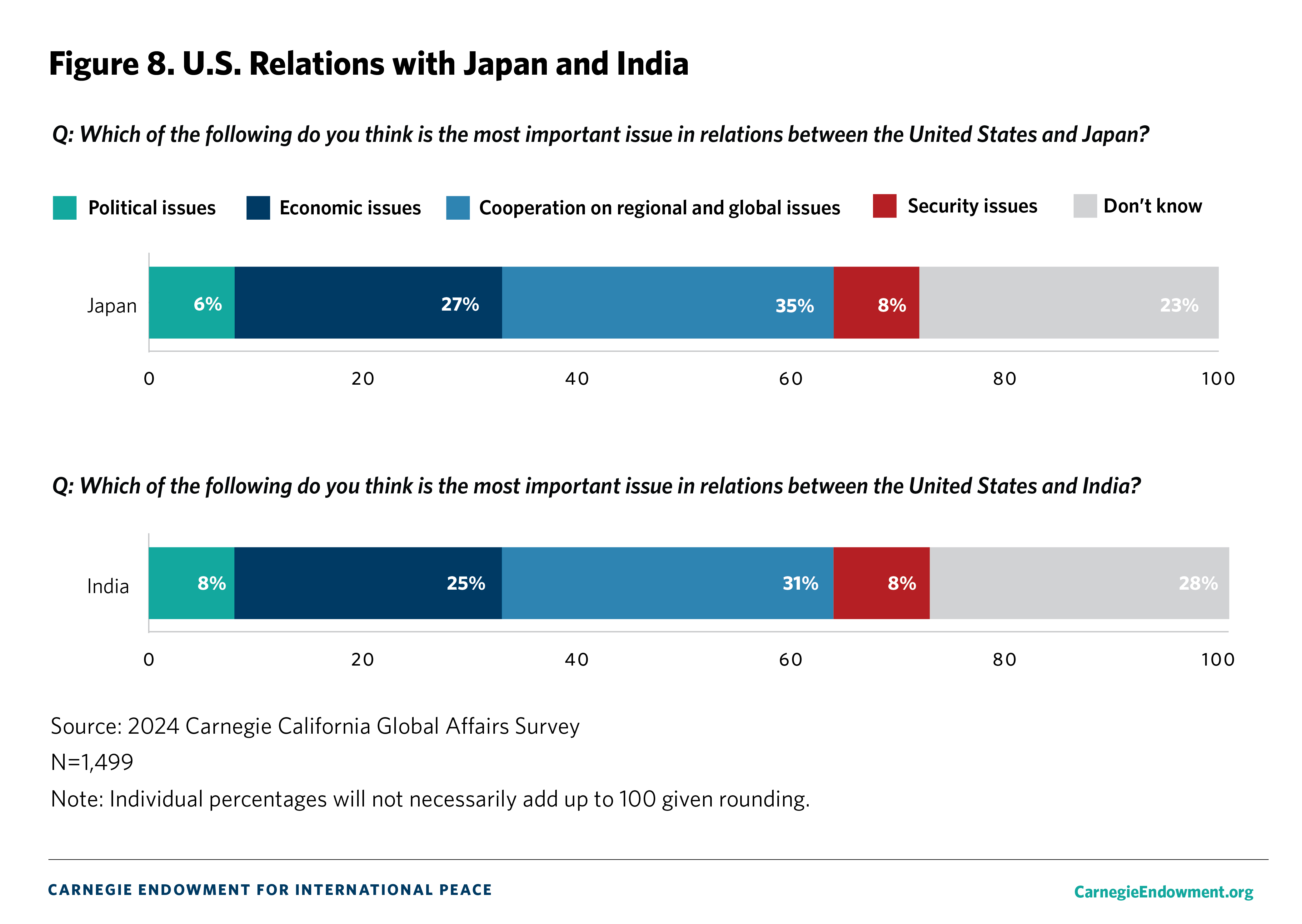
Mexico
The 2024 survey includes “security issues” as a new option for views on the U.S.-Mexico relationship, helping capture Californians’ opinions. Thirty-four percent of respondents select “security issues” as the most important in the relationship, followed by “economic issues” (24 percent), “cooperation on regional and global issues” (20 percent), and “political issues” (7 percent). In 2023, respondents were most likely to select “economic issues” (34 percent). In 2024, security issues matter the most to respondents across gender, race, and age. Democrats are evenly split between economic issues and security issues (both 28 percent), and Republicans (57 percent) and independents (38 percent) are more likely to be concerned with security issues.
Many people in the United States closely watched Mexico’s historic election of its first woman president, Claudia Sheinbaum, in June 2024.15 When asked whether they are aware of elections outside of the United States in 2024, a majority of Californians (66 percent) say they are unaware, while 34 percent say are aware of elections. Those aware of elections outside the United States are most likely to say they followed the elections in Mexico (68 percent) and Russia (40 percent).
Africa
Africa is projected to account for more than a quarter of the world’s population by 2050.16 The continent is currently home to nine out of twenty of the world’s fastest-growing economies.17 In 2023, California’s exports to sub-Saharan Africa reached $724 million.18 Despite this, in 2024, Californians see Africa as less critical for U.S. military security (4 percent in 2024 versus 5 percent in 2023) and economic prosperity (6 percent in 2024 versus 8 percent in 2023) compared to 2023. Overall, Californians prioritize Africa least when compared to all other regions for both U.S. military security and economic prosperity. However, Black Californians rank the importance of U.S. relationships with Africa as highly as those with Asia (25 percent). In particular, 23 percent say Africa is important to U.S. economic prosperity.
Migration
At the end of 2023, U.S. Border Patrol encounters with migrants crossing the country’s borders hit a record high.19 In January 2024, the Pew Research Center asked U.S. residents how serious they believe the situation at the U.S.-Mexico border is and 78 percent believe it to be either “a crisis” (45 percent) or “a major problem” (32 percent).20
When asked to what degree they see the southern border as a crisis, 35 percent of respondents to the Carnegie California survey believe “a great deal,” 26 percent believe “a fair amount,” 21 percent believe “not too much,” and 9 percent believe “not at all.” Californians are fairly in line with the broader consensus among Americans that the state of migration at the U.S.-Mexico border is cause for concern. In California, 75 percent of Republicans and 39 percent of independents believe “a great deal” that the border is a crisis, while Democrats are almost split on believing the situation to be “a fair amount” (32 percent) or “not too much” (33 percent) of a crisis.
To that end, when U.S. residents were asked in a 2024 Gallup Poll about their opinion of the level of immigration, for the first time since 2005, a majority (55 percent) said they believed the immigration level should “decrease” rather than “increase” or stay at the “present level.”21 See in figure 9 Californians’ opinions on immigration compared to this national response. This survey finds that 35 percent of Californians believe the level of immigration should “decrease,” 28 percent believe it should stay at the “present level,” and 19 percent think it should “increase.” Responses to this question vary across age groups. Forty-three percent of adults aged forty-five to sixty-four and 45 percent of adults aged sixty-five and older believe the immigration level should “decrease,” while a plurality of younger adults aged eighteen to twenty-nine believe it should stay at the “present level” (32 percent). Adults aged thirty to forty-four years old are split, with 30 percent believing the level should stay at the “present level” and 30 percent believing it should “decrease.”
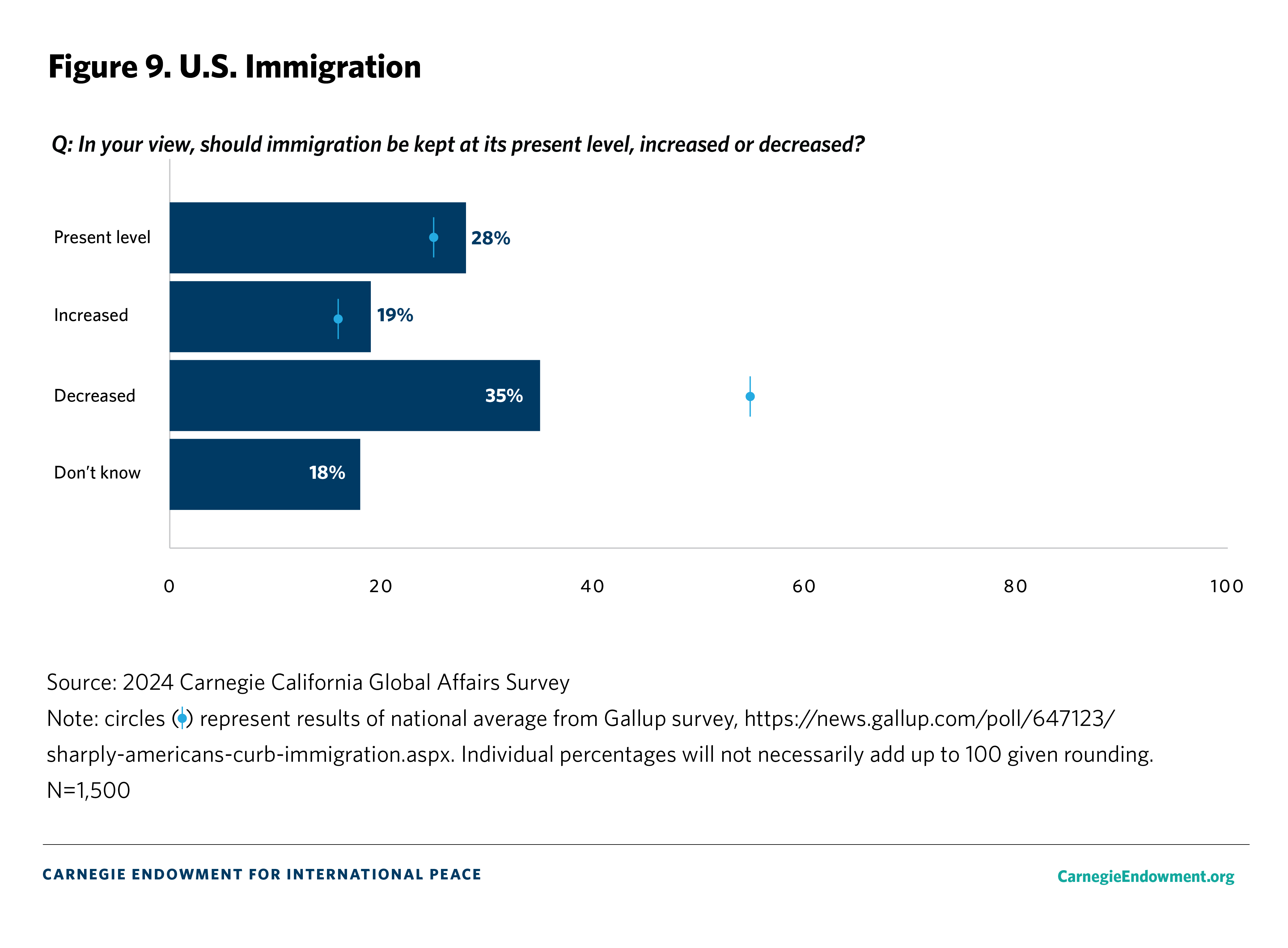
While the plurality of Californians believe immigration levels should decrease, more Californians (57 percent) hold the accurate22 position that immigrants contribute to the state and national economy than those who believe they take opportunities from workers in the country (25 percent). Black respondents are the only demographic to significantly change their response from 2023 (55 percent for contribute and 24 percent saying take away), with 41 percent believing immigrants take from the economy and 32 percent believing they contribute to it in 2024.
Unlike in the 2023 Carnegie California survey, where about half of Californians agreed (20 percent ”strongly” and 28 percent “somewhat”) that their state government should make its own policies—separate from the federal government—to protect the legal rights of undocumented immigrants in California, in 2024 Californians are about evenly split with “agreeing” (18 percent strongly agree and 25 percent somewhat agree) and “disagreeing” (16 percent somewhat disagree and 25 percent strongly disagree). Residents of Central Valley (32 percent), the Inland Empire (40 percent), and Orange County/San Diego (33 percent) are most likely to “strongly disagree,” while residents in the Bay Area (30 percent) and Los Angeles (27 percent) are more likely to “somewhat agree” that the California state government should make policies for undocumented immigrants separate from the federal government.
Section 4. California and Subnational Affairs
Late 2023 and 2024 saw a flurry of diplomatic activity by state and city officials. Perhaps most notably, in October 2023, California Governor Gavin Newsom became the first U.S. governor to visit China in more than four years and the first to have a bilateral meeting with Xi in six years.23 The California delegation focused on climate action and cooperation. This included efforts to strengthen collaboration around a cap-and-trade program and air pollution; bolster economic connections and trade, including travel infrastructure; and promote cultural connections. A month later, California hosted the APEC Leaders’ Meeting and a meeting between Biden and Xi, putting the state’s subnational diplomacy squarely in the arena and context of great power politics. Meanwhile, Californian state senators and representatives have continued the practice of global engagement around pressing challenges and issues.
Major cities in California pursue global engagement as well. In October 2023, through San Diego’s Global Affairs Office and the San Diego Regional Economic Development Corporation, Mayor Todd Gloria led a trade mission to South Korea to strengthen economic ties and attract foreign investment to San Diego.24 Ahead of the 2028 Olympics and Paralympic Games in Los Angeles, Mayor Karen Bass traveled to Paris in March 2024 to meet with city officials planning the 2024 Olympics.25 The practice of subnational diplomacy extends beyond the governor’s office, legislators, and leaders of major cities; leaders from secondary and tertiary cities also participate. In the Central Valley, city leaders are increasingly engaging with international partners around infrastructure. In May 2024, Fresno Mayor Jerry Dyer led a delegation of city council members to Tokyo, Japan, on a “fact-finding” mission centered around downtown revitalization and high-speed rail.26
Enabling Policy Exchange and Local Action
Newsom’s 2023 trip to China aligned with the priorities Californians identify for state-led international engagement. As figure 10 shows, when asked around which issue would you most like such engagement to occur, 47 percent identify climate action, 21 percent say trade, and 10 percent say cultural exchange.
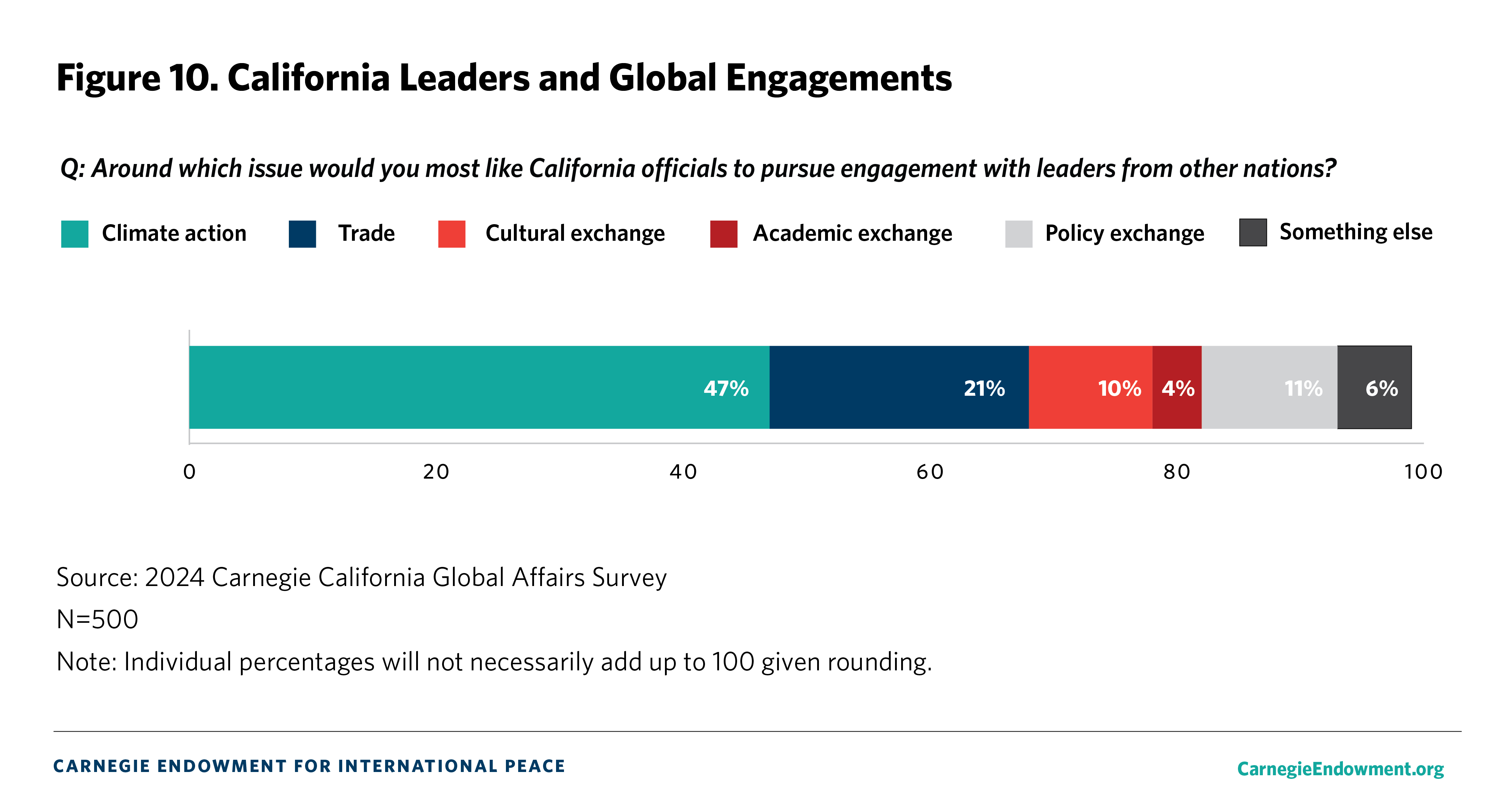
However, neither the governor’s high-profile trip nor this alignment in priorities translates into widespread support for state and local diplomacy. When asked in 2023 whether they support global engagement with leaders from other nations, two-thirds of Californians responded “no” or “don’t know.” When asked the same question this year, all changes remain with the margin of error, with 33 percent again responding, “don’t know.” The responses are similar for direct transnational engagement with other subnational leaders, such as governors and mayors.
While the global affairs priorities of Californians evolve, even year-to-year, the United States’ foreign policy priorities and positions have also shifted over the past decade, whether it be the Obama administration’s so-called pivot to Asia or the Trump administration’s withdrawal from the Paris Agreement on climate change and skepticism of alliances.27 In this context, and as figure 11 shows, nearly half of Californians express concern with potential disconnects between U.S. foreign policy and the priorities of Californians. Responses are largely consistent across political parties and regions.
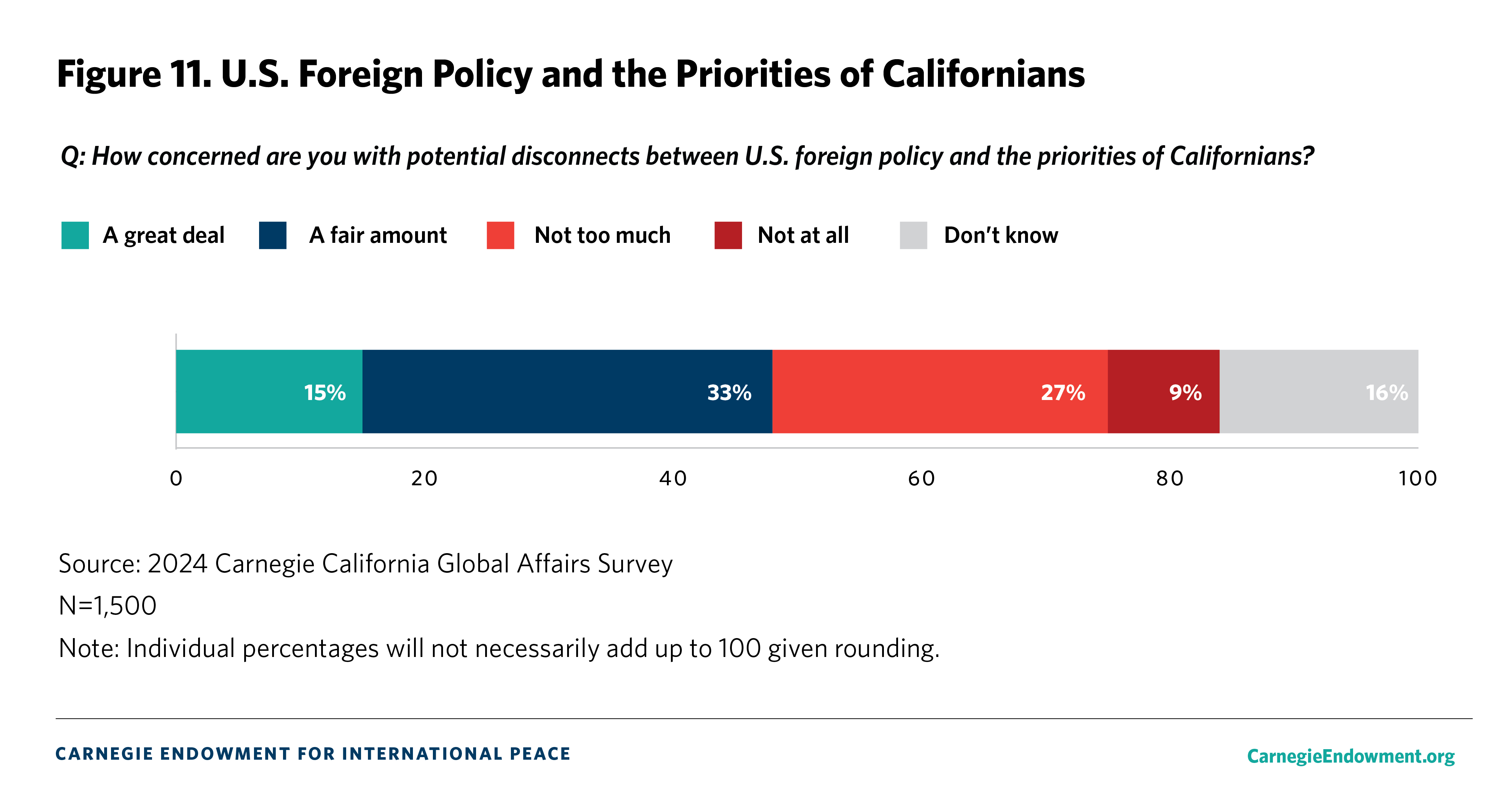
While not explicitly expressing concern around the national-level policy pivots, Californians are supportive of a role for the state in the complex web of relations that make up global affairs, including formal diplomacy, trade, and cultural and educational exchanges. Largely consistent with the findings of 2023, only a small number of Californians (12 percent) believe federal officials should restrict or discourage local officials’ international efforts, whereas 27 percent think federal officials should provide policy and security briefings for local officials, 26 percent think federal officials should enable participation of state and local officials in bilateral and multilateral settings, and 19 percent think federal officials should support bidirectional policy exchange. Californians, in other words, think the state benefits from policy-focused dialogue with other jurisdictions.
Advisers
Jennifer Barrera, CEO, CalChamber
Terri Batch, CEO, Global LA
Louise Bedsworth, executive director, Center for Law, Energy, and the Environment (CLEE), University of California, Berkeley
Erin Bromaghim, deputy mayor of international affairs, City of Los Angeles
John Chiang, former State Controller and State Treasurer and co-chair, California Forward
Kiran Jain, general counsel, Replica; nonresident scholar, Carnegie California
Heidi Knuff, executive director, San Diego Diplomacy Council
Adam Lichtenheld, executive director, Immigration Policy Lab, Stanford University
Tom Negrete, director, California Research Bureau, California State Library
Ethan Rarick, executive director, Little Hoover Commission
Evan Reade, international affairs advisor, Office of the Lieutenant Governor of California
Gabe Petek, legislative analyst, the Legislative Analyst’s Office, California Legislature
Kal Raustiala, professor of comparative and international law, UCLA School of Law
Margaret Peters, professor of political science and chair of the Global Studies Interdisciplinary Program, UCLA
Kristin Olsen, partner, California Strategies
Julia Spiegel, deputy legal affairs secretary, Office of the Governor of California
David Talbot, executive director, Indo-Pacific Partnership for Prosperity
Antonio Yung, envoy, Sacramento-China Office of California
-------------
Dan Baer, senior vice president for studies, director of Europe Program, and acting co-director of Sustainability, Climate, Geopolitics Program, Carnegie Endowment for International Peace
Hanan Coronado, intern, Carnegie California, Carnegie Endowment for International Peace
Liliana Gamboa, nonresident scholar, Carnegie California; Sustainability, Climate, and Geopolitics Program, Carnegie Endowment for International Peace
Noah Gordon, acting co-director, Sustainability, Climate, and Geopolitics Program, Carnegie Endowment for International Peace (2023)
Elina Noor, senior fellow, Asia Program, Carnegie Endowment for International Peace
Christopher Shell, fellow, American Statecraft Program, Carnegie Endowment for International Peace (2023)
Milan Vaishnav, senior fellow, director of South Asia Program, Carnegie Endowment for International Peace (2023)
Acknowledgments
We would like to thank Alexander Marsolais, Alexis Essa, and Sarah Higdon of YouGov for conducting the survey with immense care and rigor. Thank you to Carnegie scholars who advised on the project in 2024 and in 2023. Special thank you to Emily Hardy, MSc candidate at the University of Oxford, for her quality fact-checking work, and Sarah Camacho, research assistant of Carnegie’s Asia Program, for her Spanish translation. Thank you to Lindsay Maizland for editing, as well as Carnegie’s communications team: Alana Brase, managing editor; Haley Clasen, senior editor; Anjuli Das, associate editor; Amy Mellon, graphic designer; and Jocelyn Soly, creative director, for their amazing work on editing this paper and creating the incredible graphics to go along with it.
Notes
1Ian Klaus, Mark Baldassare, Marissa Jordan, “2023 Carnegie California Global Affairs Survey,” Carnegie Endowment for International Peace, October 23, 2024, https://carnegieendowment.org/research/2023/10/2023-carnegie-california-global-affairs-survey?lang=en.
2Dina Smeltz and Lama El Baz, “2023 Survey of American Public Opinion and U.S. Foreign Policy,” Chicago Council on Global Affairs, October 9, 2023, https://globalaffairs.org/research/public-opinion-survey/prior-attack-israel-majority-americans-supported-talks-hamas.
3“Topline Questionnaire, Global Attitudes Survey,” Pew Research Center, August 31, 2022, https://www.pewresearch.org/global/wp-content/uploads/sites/2/2022/08/PG_2022.08.31_Global-Threats_TOPLINE.pdf; and Richard Wike et al., “Social Media Seen as Mostly Good for Democracy Across Many Nations, but U.S. Is a Major Outlier,” Pew Research Center, December 6, 2022, https://www.pewresearch.org/global/2022/12/06/social-media-seen-as-mostly-good-for-democracy-across-many-nations-but-u-s-is-a-major-outlier.
4Mark Baldassare, “PPIC Statewide Survey: Global California: Perspectives on U.S.-Japan Relations,” Public Policy Institute of California, September 2001, https://www.ppic.org/wp-content/uploads/S_901GMBS.pdf.
5Milan Vaishnav and Nitya Labh, “How Do California’s Asian Americans View U.S. Foreign Policy?,” Carnegie Endowment for International Peace, April 26, 2023, https://carnegieendowment.org/2023/04/26/how-do-california-s-asian-americans-view-u.s.-foreign-policy-pub-89610; and Milan Vaishnav and Nitya Labh, “What Do Asian American Voters in California Want?,” Carnegie Endowment for International Peace, November 3, 2022, https://carnegieendowment.org/2022/11/03/what-do-asian-american-voters-in-california-want-pub-88305.
6“Immigration,” Gallup, 2024, https://news.gallup.com/poll/1660/immigration.aspx.
7George F. Will, “'Events, Dear Boy, Events,'” Newsweek, Published January 27, 2002, Updated Mar 13, 2010, https://www.newsweek.com/events-dear-boy-events-143481.
8The Associated Press, “A look at the protests of the war in Gaza that have emerged at US colleges,” The Associated Press, April 30, 2024, https://apnews.com/article/gaza-war-campus-protests-966eb531279f8e4381883fc5d79d5466.
9William Gallo, “Under Biden, US Reimagines Asian Alliances as ‘Lattice’ Fence,” Voice of America, April 16, 2024, https://www.voanews.com/a/under-biden-us-reimagines-asian-alliances-as-lattice-fence/7572053.html.
10“Remarks by President Biden Before the Americas Partnership for Economic Prosperity Leaders’ Summit,” White House, November 3, 2023, https://www.whitehouse.gov/briefing-room/speeches-remarks/2023/11/03/remarks-by-president-biden-before-the-americas-partnership-for-economic-prosperity-leaders-summit.
11Gabe Gutierrez and Monica Alba, “Biden Signs Executive Action Drastically Tightening Border,” NBC News, June 4, 2024, https://www.nbcnews.com/politics/white-house/biden-signs-executive-order-shutting-southern-border-rcna155426.
12 Wyatt Frank and Marissa Jordan, “California’s Global Cities,” Carnegie Endowment for International Peace, September 5, 2024, https://carnegieendowment.org/research/2024/09/californias-global-cities?lang=en.
13Mark Baldassare, “The Importance of Californians’ Views on Immigration Policies,” Carnegie Endowment for International Peace, June 21, 2023, https://carnegieendowment.org/posts/2023/06/the-importance-of-californians-views-on-immigration-policies?lang=en.
14Wendy Fry, “What Biden’s Border Order Means for California,” CalMatters, June 4, 2024, https://calmatters.org/california-divide/2024/06/mexico-border-biden-california.
15María Verza and Mark Stevenson, “Mexico Elects Claudia Sheinbaum as Its First Female President,” Associated Press, June 3, 2024, https://apnews.com/article/mexico-elections-president-governorships-lopez-obrador-d7fef5c7ac964072401ba6d9809dd7d4.
16Andrew Stanley, “African Century,” International Monetary Fund, September 2023, https://www.imf.org/en/Publications/fandd/issues/2023/09/PT-african-century.
17Zainab Usman, “9 of the 20 Fastest-Growing Economies Worldwide in 2024 Will Be in Africa,” Carnegie Endowment for International Peace, May 6, 2024, https://carnegieendowment.org/carnegie-africa-program-newsletter/9-of-the-20-fastest-growing-economies-worldwide-in-2024-will-be-in-africa?lang=en.
18"State Benefits of trade: California," Office of the U.S. Trade Representative, accessed September 8, 2024, https://ustr.gov/map/state-benefits/ca.
19John Gramlich, “Migrant Encounters at the U.S.-Mexico Border Hit a Record High at the End of 2023,” Pew Research Center, February 15, 2024, https://www.pewresearch.org/short-reads/2024/02/15/migrant-encounters-at-the-us-mexico-border-hit-a-record-high-at-the-end-of-2023.
20“How Americans View the Situation at the U.S.-Mexico Border, Its Causes and Consequences,” Pew Research Center, February 15, 2024, https://www.pewresearch.org/politics/2024/02/15/how-americans-view-the-situation-at-the-u-s-mexico-border-its-causes-and-consequences.
21Jeffrey M. Jones, “Sharply More Americans Want to Curb Immigration to U.S.,” Gallup, July 12, 2024, https://news.gallup.com/poll/647123/sharply-americans-curb-immigration.aspx.
22“Immigrants Are Vital to the U.S. Economy,” Joint Economic Committee, April 26, 2021, https://www.jec.senate.gov/public/index.cfm/democrats/reports#:~:text=Immigrants%20Are%20Vital%20to%20the%20U.S.%20Economy&text=Their%20spending%20power%2C%20relative%20youth,key%20contributors%20to%20our%20economy,key%20contributors%20to%20our%20economy. https://www.jec.senate.gov/public/_cache/files/6750b0f0-c851-4fee-9619-295582fd44e8/immigrants-are-vital-to-the-us-economy-final.pdf.
23"Governor Newsom Meets with Chinese President Xi Jinping," Office of Governor Gavin Newsom, October 25, 2023, https://www.gov.ca.gov/2023/10/25/governor-newsom-meets-with-chinese-president-xi-jinping/.
24Chris Jennewein, “Mayor Gloria, Supervisor Vargas Leading Binational Trade Mission to South Korea,” Times of San Diego, October 26, 2023, https://timesofsandiego.com/business/2023/10/26/mayor-gloria-supervisor-vargas-leading-binational-trade-mission-to-south-korea.
25Wyatt Frank and Marissa Jordan, “California’s Global Cities,” Carnegie Endowment for International Peace, September 5, 2024, https://carnegieendowment.org/research/2024/09/californias-global-cities?lang=en.
26Wyatt Frank and Marissa Jordan, “California’s Global Cities,” Carnegie Endowment for International Peace, September 5, 2024, https://carnegieendowment.org/research/2024/09/californias-global-cities?lang=en.
27Dominic Tierney, “Obama and Trump: Foreign Policy Opposites or Twins?,” Foreign Policy Research Institute, https://www.fpri.org/article/2019/12/obama-and-trump-foreign-policy-opposites-or-twins/.
